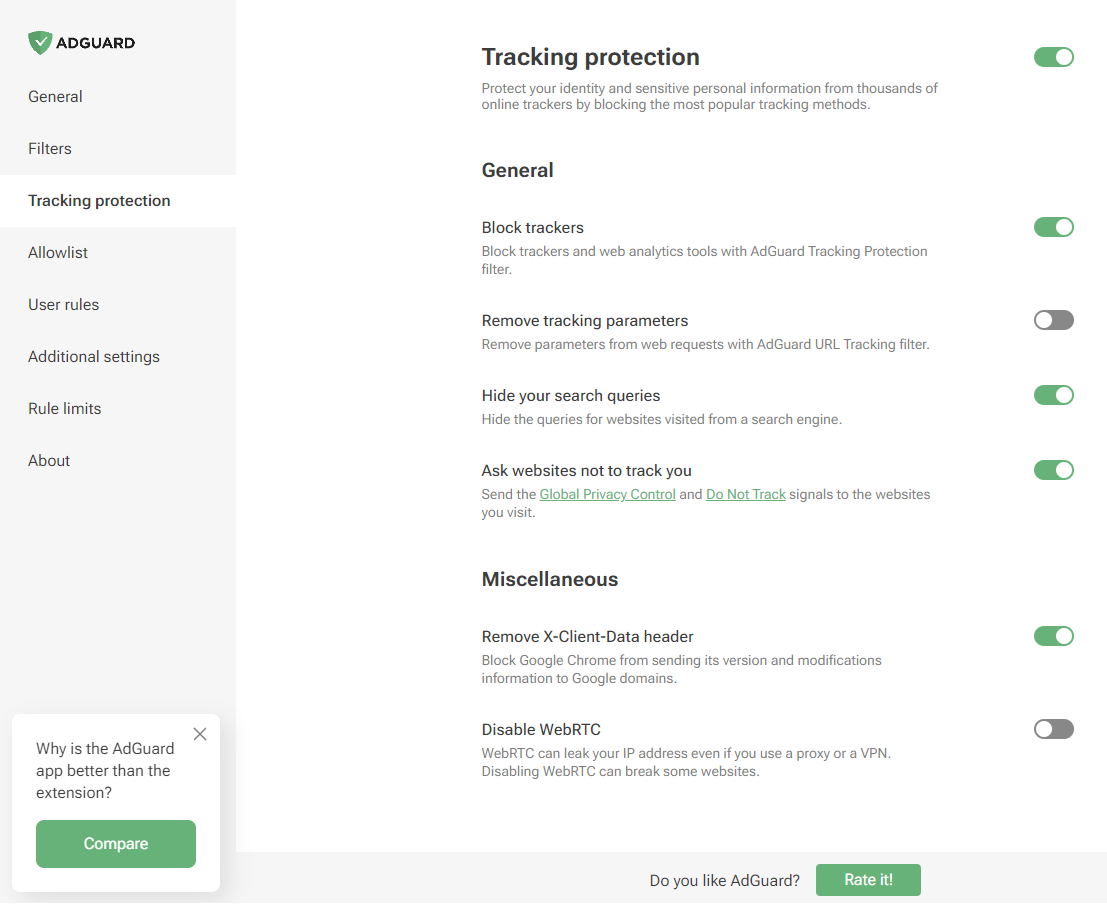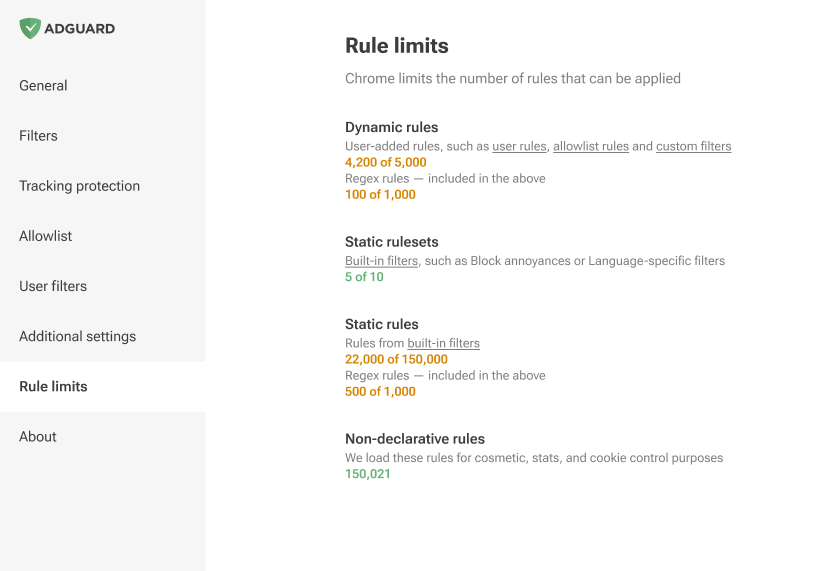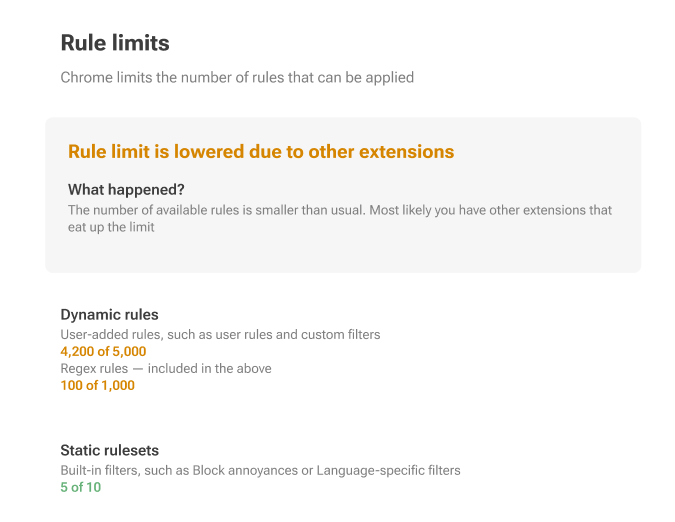Estensione AdGuard Browser per Chrome MV3
Poiché le estensioni MV2 vengono gradualmente eliminate dal Chrome Web Store, gli utenti di Chrome potrebbero dover passare alle estensioni MV3, compatibili con il nuovo API Manifest V3 di Chrome. Le nostre riflessioni su questo argomento sono ampiamente discusse sul nostro blog.
La nostra estensione MV3 blocca in modo efficace gli annunci e i tracker, gestendo al tempo stesso widget sociali, banner e annunci video. La maggior parte degli utenti non noterà alcuna differenza operativa, ma ci sono alcune limitazioni e modifiche di cui essere a conoscenza.
Dove trovare le nostre estensioni
La versione MV3 ha sostituito la nostra vecchia estensione nel Chrome Web Store.
La versione beta di MV3 sarà ancora disponibile nel Chrome Web Store.
La vecchia estensione beta verrà rinominata AdGuard Ad Blocker MV2 e sarà supportata finché Google non la eliminerà gradualmente.
Principali modifiche alle funzionalità e alle impostazioni
Nessun aggiornamento automatico o manuale dei filtri. Le opzioni Aggiorna automaticamente i filtri e Controlla aggiornamento filtri non sono più disponibili nella scheda Filtri. Poiché alcune regole sono ora applicate in formato DNR, non possiamo aggiornare i filtri su richiesta, ma solo attraverso l'intero processo di aggiornamento dell'estensione insieme alla revisione negli negozi con app.
Registro di filtraggio
! Registro di filtraggio *border
A causa delle restrizioni DNR, non possiamo mostrare esattamente quale regola ha funzionato, ma forniremo una "regola presunta che è stata attivata" in base al nostro motore. Per informazioni più precise, dovrai installare tu stesso la versione "scompattata" dell'estensione nel tuo browser. Troverai istruzioni dettagliate su come farlo in un articolo separato.
Protezione dal tracciamento (precedentemente nota come Modalità invisibile)

Non sono presenti sezioni Cookie, così come Autodistruzione dei cookie proprietari e Autodistruzione dei cookie di terze parti, poiché non possiamo impostare il TTL dei cookie utilizzando regole dichiarative.
La protezione da phishing e malware non è più disponibile nelle impostazioni generali. Per proteggerti da siti web dannosi e truffe, attiva i filtri Sicurezza appropriati nella scheda Filtri.

Limitazioni
Quantità massimale di regole e filtri
Manifest V3 impone limiti alle regole statiche e regex per estensione. Gli utenti potrebbero ricevere notifiche quando questi limiti vengono superati.


Fondamentalmente, Manifest V3 divide le regole in statiche (integrate) e dinamiche, con limiti rigorosi.
Regole statiche: minimo 30.000 regole per estensione, con un limite cumulativo di 330.000 per tutte le estensioni installate da un singolo utente.
Per le regole regex, il limite è impostato a 1.000 per estensione.
Il numero massimo di filtri abilitati contemporaneamente è 50.
Regole dinamiche: è imposto un limite massimo di 5.000 regole, che include un massimo di 1.000 regole regex.
If this limit is exceeded, only 5,000 converted rules will be applied in the following order: first Allowlist, then User rules and finally Custom filters.
Le regole convertite sono regole che sono state trasformate in [formato DNR] utilizzando il convertitore dichiarativo. Durante questo processo di conversione, alcune regole potrebbero sovrascriverne altre (
$badfilter), alcune potrebbero essere combinate ($removeparam), producendo un elenco di regole con un ordine leggermente diverso.Da questo elenco di regole convertite, ne utilizzeremo solo 5.000. Gli altri verranno visualizzati nell'editor, ma non applicati.
Ecco come una regola con un modificatore di base viene convertita in una regola dichiarativa:
||example.org^$script,third-party,domain=example.com
viene convertita in
[
{
"id": 1,
"action": {
"type": "block"
},
"condition": {
"urlFilter": "||example.org^",
"domainType": "thirdParty",
"initiatorDomains": [
"example.com"
],
"resourceTypes": [
"script"
]
},
"priority": 302
}
]
Altri esempi possono essere trovati su GitHub.
Modificatori delle regole di rete
I modificatori delle regole di rete presentano delle limitazioni: alcuni di essi non possono essere implementati in MV3 oppure possono essere implementati solo con delle restrizioni.
Ulteriori dettagli sulle limitazioni sono disponibili su GitHub. Per ulteriori informazioni sui modificatori, fare riferimento alla nostra Knowledge base.